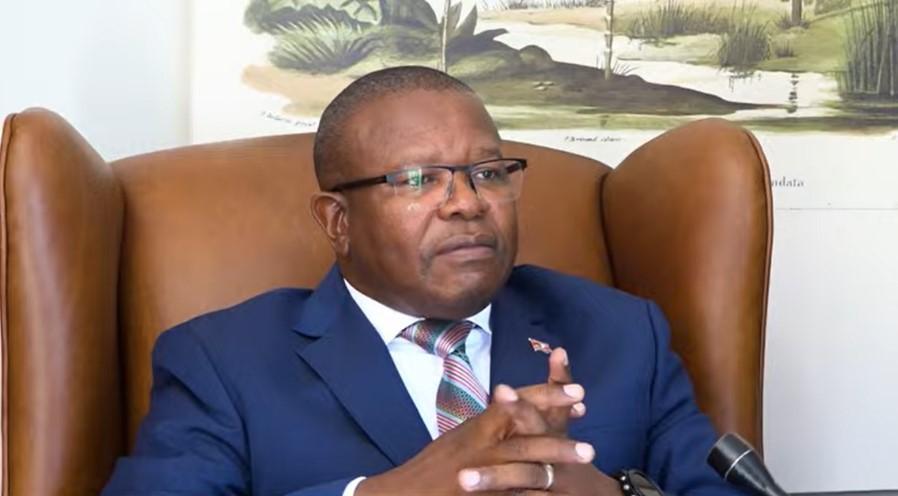Africa-Press – Eswatini. When Commerce, Industry and Trade Minister Manqoba Khumalo assumed office for a second term recently, his work to create jobs in the country to stem the detrimental effects of unemployment had been well cut out for him.
Dozens of speakers at the national cattle byre set the job creation agenda when they relayed every parent’s worst nightmare of investing in the education of their children only to have them sitting at home with their certificates and degrees. Subsequent to this, His Majesty referred to the unemployment situation in the country as a national disaster, sehlakalo, when closing Sibaya. He directed that the new Cabinet team set out to urgently address this challenge.
The expectation was that the minister would execute this task with the wind of the business community beneath his wings. Contrary to this expectation, the minister finds himself having to put out a flame that is threatening to grow into a raging fire in the business community as the Federation of Eswatini Business Community (FESBC) has launched an attack on some of the country’s big businesses, uttering numerous allegations that are yet to be backed up by evidence.
The corporations have hit back hard and the business environment is currently smoked with emotions that have now diverted the minister’s focus from carrying out the Sibaya jobs mandate, among other essential job creation initiatives, to that of having to save the insufficient jobs we have. While it is in the nature of business to compete fairly, malpractices do exist and that is why there are laws to try and guard against them. We also have institutions like the Eswatini Competition Commission that are established to ensure there are fair business practices in the industry. It has the power to investigate any complaints and issue findings or fines where breaches have occurred.
The Ministry of Commerce, Industry and Trade has also pushed for the legislation of the Citizens Economic Empowerment Act, which seeks to protect local and small and medium enterprises from unfair competition. This is a product of concerns raised by the small business community, which felt strongly about the need to protect certain businesses for locals. What is notable here is that these concerns were raised in a civil manner and the concerns were taken to Parliament, where legislation has now been promulgated.
Growth
The Act has just been passed and one would expect the industry to give it an opportunity to take effect as it provides for engagement and conflict resolution mechanisms that promote business growth. We also recall Business Eswatini going behind closed doors with labour unions to iron out their differences to chart a sustainable way forward that is mutually beneficial for all. This is an indication that the country has structures and processes that can result in desired outcomes that serve the best interests of the country.
Right now, the interests of the country should be focused on the unemployed youth. Many of our young people are turning to drugs, crime and other harmful practices because they are not as multi-skilled as the children of other nations, who instill practical skills that could see them turn to income-generation projects for survival. This scenario, as people warned, is a good recipe for strife. We have all seen what an idle youth is capable of doing when incentivised by anybody who promises anything better than nothing. The social unrest is a scenario we never want repeated and unless we close the vacuum, this threat will always prevail.
It is because this volatility prevails that we become very suspicious of actions that lean towards exploiting this space to drive an illegitimate agenda.
When we see one of the stakeholders in the business industry decide to raise concerns about alleged malpractices in the industry outside of these structures and without substantial proof of the allegations, we have good reason to raise a number of questions.
More so when you are told there have been invitations extended to FESBC by Business Eswatini, which were turned down. The reasoning from FESBC is that the big business failed to open its gates to an FESBC fact-finding mission. Frankly speaking, I would find it hard to discuss my business strategies with competitors, when there are legally established officers and structures entrusted with such authority. This is not to say there are no issues that need to be raised, but the motive has got to be in the best interest of the country.
The growth and expansion of the Inyatsi Group into several sectors has created a lot of talk, no doubt, but let us raise our concerns with justifications, not wild accusations. The Inyatsi/FESBC matter is now in court and Inyatsi has demanded that the federation stop making false accusations about the company. FESBC is defending its actions, arguing that it has the proof. However, none has been shared with the media as yet. All we have seen is a statement from United Holdings saying the information provided by FESBC to the Competition Commission is false. So what are we to believe at the end of the day? Just as we must now allow the court process to take its course, may all parties concerned use the existing structures to iron out their differences for the greater good.
Source: times
For More News And Analysis About Eswatini Follow Africa-Press







